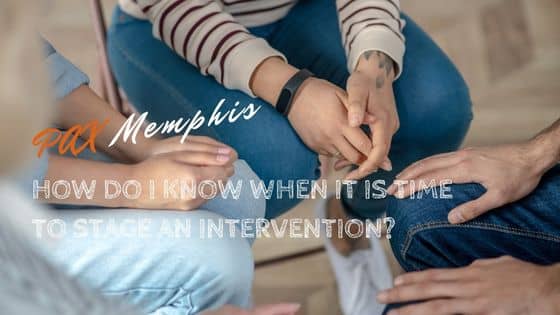Watching someone you love struggle with addiction can be devastating, frustrating, or lead you to give up hope. To you, it might be clear that your addicted loved one needs support and treatment–but how can you get them to see that?
Many concerned friends and family members of addicts stage an intervention to encourage them to seek treatment. Interventions are shown to be highly effective at motivating addicted people to agree to go to rehab.
But when is the right time to stage an intervention? Choosing the right time and place can make or break the success of your intervention, so it’s important to consider your options carefully.
For more information about staging an intervention or to learn more about our substance abuse treatment programs, reach out to the PAX Memphis specialists today.
What is an Intervention?
An intervention is a planned event where friends and family of an addicted person gather together to encourage the person to seek immediate substance abuse treatment. During an intervention, people close to the addict may speak about how the addiction has impacted their relationship and ask them to get help. It is common for family members and friends to set firm boundaries with the addicted person. They may outline what will happen if the addicted person accepts or refuses to go to treatment.
You may have a sense of what happens during an intervention because you’ve seen one on TV or in a movie. While on-screen portrayals of interventions tend to be dramatized and chaotic, real-life interventions can be calm, organized, and effective.
The most effective interventions usually happen under the guidance of a trained, professional interventionist. A professional interventionist can help you decide the right time to stage an intervention and provide valuable support and referrals throughout the process.
When to Stage an Intervention: The Signs of Addiction
The first step in deciding when to stage an intervention is recognizing that your loved one has a problem. In some situations, the person’s addiction will be clear. In others, you may need to gather evidence to support your idea that they are living with substance abuse. There are some physical and behavioral signs of addiction.
Some of the signs of addiction include:
- Spending a lot of time talking and thinking about drugs or alcohol
- Falling behind at work, in their responsibilities at home, or in school
- Changes in appearance, mood, sleep patterns, or appetite
- Unexplained legal or financial trouble
- Needing more of the substance to get the same effect
- Isolating from friends and family
- Lying, hiding, or covering up substance abuse
Ideally, you would stage an intervention at the earliest signs of addiction. Many people cover up the signs of addiction until they can no longer keep it hidden.
Four Signs it’s Time to Stage an Intervention
While it’s best to stage an intervention as soon as possible once you’ve recognized the signs of addiction, you may not always be able to act as quickly as you’d like or acknowledge their need for help until the addiction has taken hold.
Here are some clear signs that it’s time to stage an intervention.
- Their behaviors pose a risk to their safety and the safety of others: This may include driving while intoxicated or engaging in illegal activity to support their addiction.
- You can’t trust them anymore: The person begins to lie or be deceitful to cover up their substance abuse. You do not trust them to do what they say or respect your boundaries.
- Their health is at stake: The person is sick, becomes injured, or develops chronic health conditions related to their substance abuse.
- Their loved ones have reached their limits: Friends and family can no longer provide emotional or financial support. They feel hopeless and burnt out. They have tried but can no longer see the point.
These signs point to the need for an intervention. In addition to helping addicted people recognize the need for treatment, staging an intervention can help families get on the same page as they decide how to support their addicted loved one.
When to Stage an Intervention for Someone in Denial
Denial is a coping mechanism that prevents the mind from recognizing the severity of an overwhelming situation. Mental health experts believe denial can help people function in highly-stressful situations.
However, denial can also keep people with addiction from realizing that they need substance abuse treatment. Even as a person faces more severe consequences of their addiction, they may continue to deny that their substance abuse requires attention. People may lose their job, have strained relationships, or sustain injuries related to their substance use and not seek treatment.
In many cases, a person’s denial can be so deeply-rooted that it takes a catastrophic event–the loss of a relationship, a serious injury or accident, legal trouble, or a life-threatening medical diagnosis–to break through it. In some cases, though, an intervention may be enough to help them realize the severity of their problems.
Knowing when it is time to stage an intervention can be challenging, but it is generally best to do it as early as possible. The longer you wait to intervene, the more likely the person will face serious, sometimes life-threatening consequences.
Get Help Now
If you or someone you love require addiction treatment or support during recovery, contact the caring specialists at PAX Memphis today.
Medically Reviewed: September 25, 2019

All of the information on this page has been reviewed and verified by a certified addiction professional.










